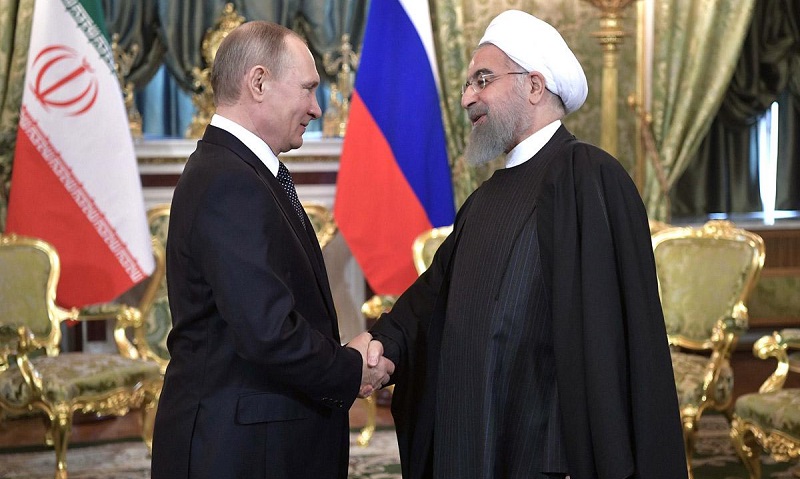Alwaght- Russia slammed the US potential withdrawal from multilateral Iran nuclear deal as of Washington’s grave foreign policy mistakes and urged world to stand against American sanction policy.
According to Russian deputy foreign minister Sergey Ryabkov, Moscow believes that Washington has either already made or is close to making a decision to scrap Iran nuclear deal, officially known as the Joint Comprehensive Plan of Action (JCPOA).
“This may be one of Washington’s major foreign policy mistakes, one of the major failures of American politics,” Ryabkov told Interfax on Saturday.
Iran and the five permanent members of the United Nations Security Council – the US, France, Britain, Russia and China – plus Germany signed the nuclear agreement on July 14, 2015 and started implementing it on January 16, 2016.
Under the deal, Iran undertook to curb its nuclear activities and place them under total control of the International Atomic Energy Agency (IAEA) in exchange of abandonment of the sanctions imposed previously by the United Nations Security Council, the European Union and the United States over its nuclear program.
After Tehran had implemented its part of the deal, which was confirmed during IAEA’s inspection trips, on January 16, 2016 the US administration under President Barack Obama lifted sanctions imposed on Iran over its nuclear program. Nevertheless, many other illegal and unwarranted restrictions remained in place. On October 13, 2017, current US President Donald Trump refused to confirm Iran was implementing the nuclear deal.
Despite his hatred of the Iran nuclear deal, earlier Friday Trump left the accord intact for now – but has given European allies 120 days to agree to a new deal or the US will pull out.
Trump is waiving nuclear sanctions against Iran for the last time, administration officials said.
The action is the third time Trump has given a reprieve to the agreement negotiated by the Obama administration, even though he has called it “the worst deal ever”.
Meanwhile the US Department of the Treasury sanctioned on Friday 14 individuals and entities over involvement in Iran’s ballistic missile program.
In light of the enlargement of the US sanction list, Russia calls on the international community to stand against the US sanctions, calling them “chaos and madness.”
The US propagandistic campaign against the Iranian missile developments is part of plans to pave the way for a new scenario. Seeing the nuclear issue a closed case, the US-led West is trying to open a new path of confrontation of the Islamic Republic.
The recent postures of Europe and the US against the domestically-developed Iranian missiles comes while Tehran’s boosting of its defense capabilities is rated logical and legitimate within the framework of the international treaties and conventions. Tehran argues that its military spending is far behind the huge military purchases of the neighboring countries that buy Western arms. Very recent example is Saudi Arabia that in May signed with the US a huge deal of arms worth $100 billion. Over the past few years, other Arab countries reached similar deals of military purchases with Washington to develop their military potentials. The UAE, for instance, sealed a deal in 2008 with the Americans to acquire Patriot missile defense systems.
So, while the other regional countries are in sustained effort to bolster their military strength, the Islamic Republic finds it highly logical to shore up its defense might. With arms sanctions imposed on it over the course of the past decades, Tehran moved towards designing domestic defense mechanism and deterrence network, including work on promoting its missile defense.
The West raises its voice in questioning of the Iranian missile development while it turns blind eye to the Israeli resistance to international calls to join the Non-Proliferation Treaty as well as development of a large arsenal of nuclear warheads, something not only posing threats to the regional security but also setting up roadblocks ahead of international peace efforts.
The anti-Iranian Western, and specifically American, belligerence has no sight of ending, something frequently highlighted by the Iranian officials. Their problem is originally with the very Islamic Republic that is opposed to colonialist and domineering policies across the world. Nuclear case was closed but this marked no end to their anti-Iranian attitudes. The West now questions Iranian missile program, and there is an expectation that if this case is concluded, they will bring forth another issue. Westerner powers want a submissive Iran, similar to such countries as Saudi Arabia and its allies. The West wants a milk cow, as Trump put it referring to the Arab sheikhdoms that have wealth of oil, which is valuable as long as it gives milk. The West is angry with Iranian questioning of the global arrogance. This has been the Western governments' nature for hundreds of years, and so they are expected to continue anti-Tehran pressures and hostility.



























